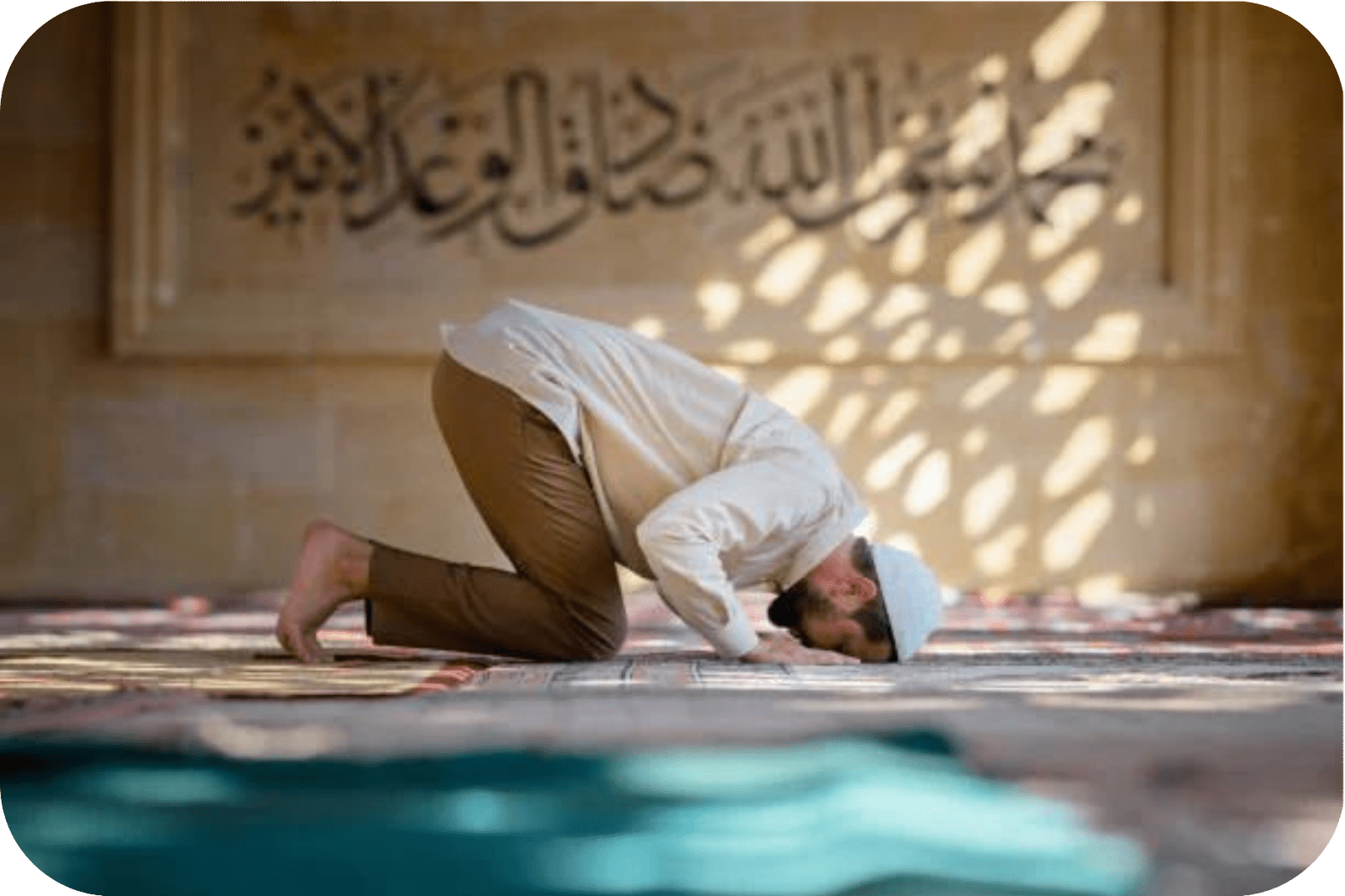How to Pray Eid Prayer - Step by Step Guide
How to Pray Eid Prayer - Step by Step Guide

In the Islamic calendar, Eid al-Fitr and Eid al-Adha are two of the most significant religious festivals celebrated by Muslims worldwide. These joyous occasions mark the culmination of fasting during Ramadan and the conclusion of the Hajj pilgrimage, respectively.
Central to the observance of Eid is the special congregational prayer known as the Eid prayer, or Salat al-Eid. In this step by step guide, we'll delve into the significance of Eid prayer and how it's performed. Whether you're new to Eid prayer or looking to enhance your understanding, we are here to help you navigate this spiritual practice with ease and devotion.
But that's not all. If you're in need of prayer essentials or decorations to enhance your Eid experience, look no further! Visit our marketplace to explore a wide range of gifts, decorations, and other essentials to make your Eid even more meaningful.
What is Eid prayer
Eid prayer, also known as Salat al-Eid or the Festival Prayer, is a special congregational prayer performed by Muslims on the days of Eid al-Fitr and Eid al-Adha, and It is considered a Sunnah of Prophet Muhammad (peace be upon him).
Eid prayer marks the culmination of the fasting month of Ramadan (Eid al-Fitr) or the conclusion of the Hajj pilgrimage (Eid al-Adha). This prayer serves as a symbol of unity, gratitude, and celebration among Muslims worldwide, fostering a sense of belonging and spiritual fulfilment within the community.
It offers an opportunity for Muslims to come together in worship, express gratitude for blessings received, and seek forgiveness for past sins, reinforcing the bonds of brotherhood and sisterhood in Islam.
When is Eid prayer performed
Eid Prayer is performed on the day of Eid al-Fitr, which falls on the first day of Shawwal, the month following Ramadan.
It is also performed on the day of Eid al-Adha, which coincides with the 10th day of Dhu al-Hijjah, the final month of the Islamic lunar calendar, which is the 4th day of the Hajj pilgrimage.
The timing of Eid Prayer typically begins after sunrise and it is recommended to be performed in the early morning, allowing time for other festivities and celebrations throughout the day.
How to prepare for Eid Prayer
To prepare for Eid prayer, start by making your intention (niyyah) in your heart or verbally, such as "I intend to pray two rak'ah of the Eid al-Fitr/ Eid al-Adha prayers for Allah facing the Ka’bah".
For Eid al-Fitr it’s Sunnah to eat something sweet like dates before the prayer. This act signifies the end of Ramadan fasting and the joyous occasion of Eid.
While in Eid al-Adha it’s Sunnah to eat, after the prayer and preferably from the Qurbani meat. This act of sharing and enjoying food reflects the spirit of sacrifice and generosity associated with Eid al-Adha.
It's advised to wear your finest clothes and accessories. This shows thankfulness for the blessings you've received and helps create a festive mood.
Remember to fulfil your obligation of Zakat al-Fitr (Fitrana) before the prayer. Zakat al-Fitr is a form of charity obligatory for every Muslim, ensuring that those in need can also celebrate Eid with joy and abundance.
How to pray Eid prayer?
The Prophet Muhammad (peace be upon him) emphasised the importance of offering Eid prayer, he said:
“angels on the day of Eid stand at the alleys and paths and say, 'rush to the Generous Lord who gives great blessings and forgives great sins."
(Al-Bukhari and Muslim)
Here’s a simple breakdown of how to perform Taraweeh:

1. Before You Start
Before heading to the Eid prayer, it's recommended to perform ghusl (ritual purification) to spiritually cleanse oneself. This act signifies readiness for the special occasion of Eid. Additionally, wearing one's best clothes reflects the joy and festivity of the day.
Recite the Takbeer while travelling to the prayer location: "Allah is the Greatest, Allah is the Greatest. There is no god but Allah, and Allah is the Greatest, Allah is the Greatest, and to Allah belongs all praise."
This is a declaration of the greatness of Allah and acknowledgment of His praise, enhancing the spiritual atmosphere of the journey to the prayer site.
2. First Rak'ah
During normal prayers, Takbeer is said only once, but for the Eid prayer, Takbeer is said 12 times in two rak'ahs.
Begin by raising your hands and saying Takbeer: "Allah is the Greatest." This gesture marks the start of the prayer and symbolises submission to the will of Allah.
Place your right hand over your left below the chest (for men) or below the naval (for women). This posture signifies humility and focus during prayer.
Recite the opening supplication:
"Glory is to You, O Allah, and praise. Blessed is Your Name, and exalted is Your Majesty. There is no god but You."
Transliteration: “Subhaanaka Allaahumma wa bihamdika, wa tabaarakasmuka, wa ta’aalaa jadduka, wa laa ‘ilaaha ghayruka.”
This supplication glorifies and praises Allah, setting the tone for the prayer.
Follow the Imam in reciting the rest of Takbeers and Surah al-Fatihah and another surah. This follows the usual pattern of recitation in Islamic prayers, with Surah al-Fatihah being obligatory in every Rak'ah.
Complete the Rak'ah as usual. This involves performing the usual movements of bowing, prostration, and sitting in reverence to Allah.
3. Second Rak'ah
In the second Rak'ah, the Imam will again recite Surah al-Fatihah and another surah. This mirrors the structure of the first Rak'ah, maintaining consistency in the prayer.
Listen to the Imam recite three more Takbeers, then follow him in bowing (ruku). This movement signifies submission and humility before Allah, a fundamental aspect of Islamic prayer.
Complete the Rak'ah as usual. Repeat the actions of the first Rak'ah, concluding the prayer with reverence and devotion.
4. After the Prayer
Listen attentively to the Khutbah (sermon) delivered by the Imam. The Khutbah provides spiritual guidance and reminders relevant to the occasion of Eid, reinforcing important Islamic values and principles.
Take a different route home after the prayer as recommended by the Prophet Muhammad (peace be upon him). This practice is a symbolic gesture of gratitude to Allah and serves as a means of seeking blessings for the journey.
Can Eid Prayer be performed at home ?
Eid prayers are traditionally performed in mosque settings and in groups, it's not the ideal or recommended practice to be performed individually at home.
Eid prayer holds significant communal importance, symbolising the unity of the Muslim community and the joyous celebration of Eid. As such, it's traditionally performed in an open area, such as a mosque or an Eid prayer ground, to accommodate the congregation.
Doing so allows Muslims to partake in collective worship, strengthen community bonds, and experience the full spirit of the occasion. Therefore, it's encouraged to join the congregation in a designated Eid prayer location to fully engage in the festivities and share the joy of Eid with fellow worshippers.
Conclusion
In conclusion, Eid prayer is a vital aspect of the Islamic tradition, marking the culmination of significant religious events and fostering a sense of community and celebration among Muslims worldwide.
Understanding the essence and rituals of Eid prayer enhances one's spiritual connection and appreciation for these sacred occasions. By adhering to the recommended practices and participating in the congregation, Muslims can fully immerse themselves in the joyous atmosphere of Eid while honouring the teachings of Islam.
At Riwaya, we embrace the spirit of Eid by offering a diverse range of Islamic products and gifts that enrich your celebration and deepen your spiritual journey, explore our collection today and elevate your Eid experience.
Buying at Riwaya
At Riwaya, we understand the importance of finding meaningful and high-quality products to enhance your spiritual journey and celebrations.
That's why we offer a diverse range of Islamic products, explore our curated selection of heartfelt eid decorations at Riwaya! Embrace the beauty of eid and adorn your home with a creative and welcoming atmosphere that reflects the importance of this day.
Selling at Riwaya
Join Riwaya's platform, dedicated to connecting creators with a discerning audience seeking the best decorations products. Showcase your handcrafted items that embody the essence of Eid—celebrating spirituality, tradition, and togetherness.
Become a part of Riwaya's community and share your unique creations. Let your creativity inspire generosity and joy during this auspicious time.
FAQs
Q1: What is Takbeer?
Takbeer refers to the Arabic phrase "Allahu Akbar," which translates to "Allah is the Greatest." It is recited aloud during various Islamic rituals and celebrations, including Eid al-Fitr and al-adha prayers, to glorify and praise Allah.
Q2: Is Eid prayer compulsory for females?
While attending the Eid prayer is encouraged for both men and women, it is not obligatory for females according to Islamic teachings. However, women are welcome to participate in Eid prayers if they wish, and many mosques offer separate prayer areas or accommodations for women during Eid.
Q3: What are the rules for Eid prayer?
The rules for Eid prayer include:
- Performing ghusl (ritual purification) before attending the prayer.
- Wearing clean and modest attire.
- Reciting the Takbeer aloud while travelling to the prayer location.
- Offering the prayer in congregation, preferably in an open area or mosque.
- Following the specific prayer format, including the number of rakats (units) and supplications, led by an Imam.
Q4: Is it mandatory to pray Eid prayer?
While it is not obligatory (fard), Eid prayer is highly recommended sunnah, and neglecting it without a valid reason is considered discouraged (makruh) in Islam.



